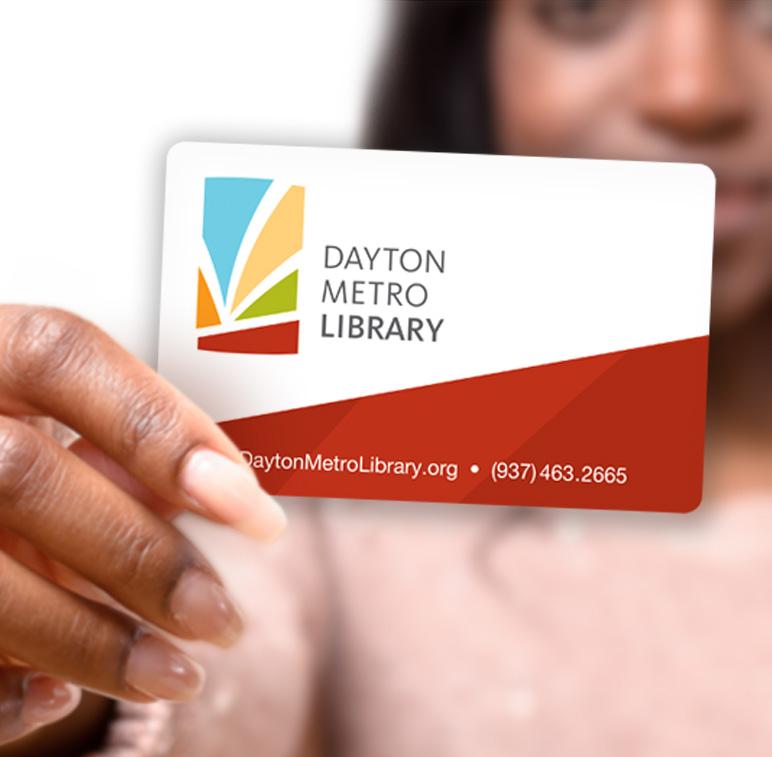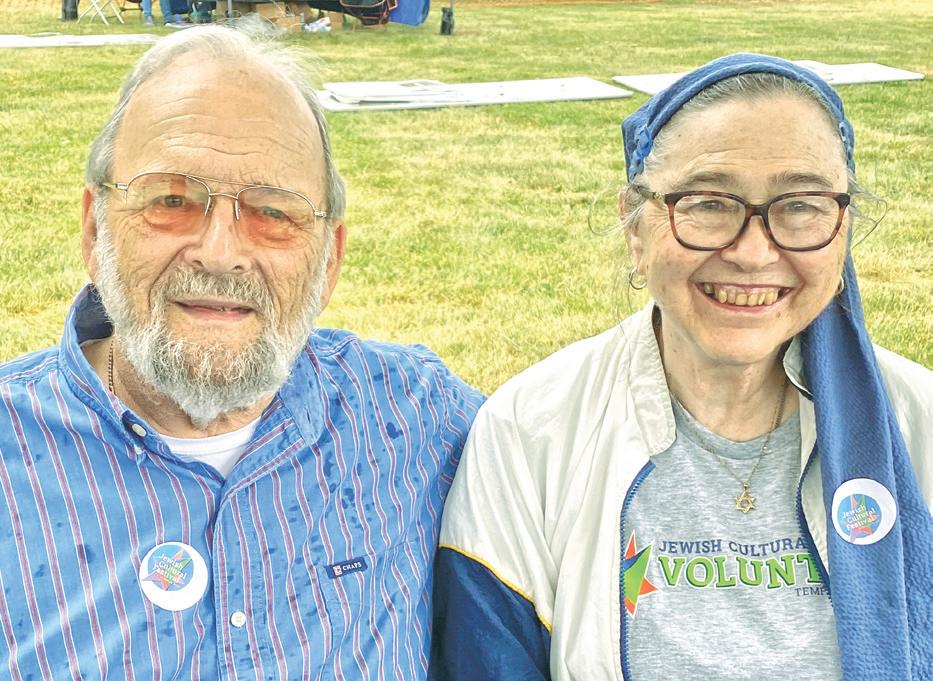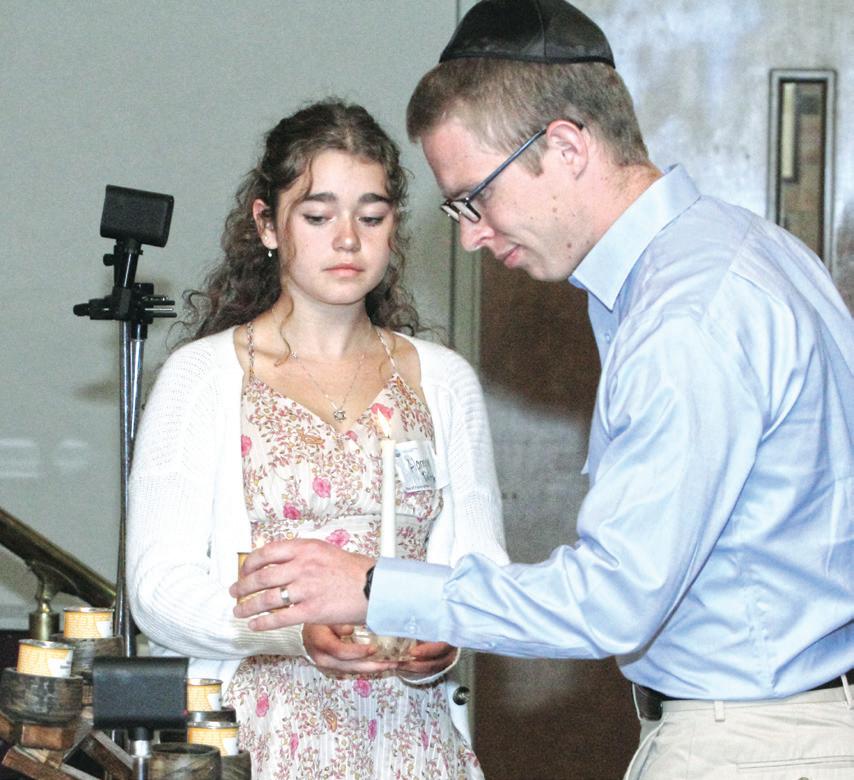
8 minute read
Journeys to Judaism
Continued from Page Five being religious when I was young. It was always a central part of my life."
He says atheism played a big part in shaping his life and the "religious ideals" that led him to Judaism. He began exploring Judaism a year after college, in 2001 in Toledo. He bounced back and forth between Judaism and Catholicism and then was an atheist from his late 20s through his mid 30s.
Advertisement
"Even though I had renounced God, I still thought a lot about religion," he says. He continued reading about religion and attended Jewish and Catholic worship services.
"I attended them because they had a meditative quality, something I needed after my father died in 2013," he says. "During that time, I came to realize that I had a very narrow idea of God." He came to appreciate what he describes as the "life affirming, positive idea that Judaism has of God."
He decided to convert to Judaism in 2018, but hesitated. "I was worried about antisemitism increasing around that time, especially with the Pittsburgh synagogue shooting and the fact that the FBI stopped a potential shooting at Temple Shomer Emunim in late 2018." Shomer Emunim is the temple in Toledo where Nick would attend services.
"Ultimately, I had to make the decision that if I had an affinity for the Jewish people and their faith, that I couldn't let fear dictate my life decisions."
Nick formally entered the conversion process in fall 2019 at Temple Shomer Emunim while still living in Toledo. He had to put it on hold when Covid hit.
"That was kind of a kick in the teeth," Nick says. "I had to wait 20 years and then to wait even more. And then when we moved, I started the conversion process pretty much all over again with Rabbi Karen down here. It's a religion that centers on my relationship with God. I enjoy the intimacy of that relationship to God, that the responsibility of forming a relationship with God is with me and only me."
He adds that reading Maimonides was especially eye-opening. "God is somewhat mysterious. You have to wrestle with the idea of God. That's what Israel means. It embraces uncertainty, which is what I like. There's no definite reality of God. You have to essentially come to terms with that and figure it out."
Nick says his wife, an agnostic, is incredibly supportive. "We've chit chatted about religion, but a conversion was not for her."
Reactions of family and friends
Mariah Strickland says her husband is also supportive of her journey, "but it's not something that he particularly feels the need to parse out for himself yet."
She says her parents, who live in New York state, are supportive but not entirely understanding.
"I think I didn't fully appreciate how Christian-leaning most of the world is. And even though I haven't necessarily walked that path for many years, I think there's a difference between 'we just don't talk about it,' versus 'I am actively choosing another path that I believe very strongly in.' They ask a lot of good questions."
Her in-laws, Mariah says, struggle more to understand why she chose to become a Jew. They live here in Ohio. They're of the mind-set that one who does not accept Jesus as their savior will burn eternally in Hell, Mariah says. By that measure, they're concerned for their son, too. And they've said all of this to Mariah directly. Her husband, she says, has her back.
"Even though he hasn't found exactly what he believes, he believes that people should be able to choose what is right for them," Mariah says. "And there's been a big adjustment in terms of seeing my sense of purpose and my sense of happiness and enjoyment of life. And so, he supports me very much with his family.
"We've been together for over 10 years now. I think it's to the point where I'm enough in the family where I can advocate for myself. And I also feel like that's an important part of learning to become Jewish: it seems very un-Jewish to hide your Jewishness."
When Alexandria King told her father she was converting to Judaism, she says, he was more surprised than anything else, "just because I had spent so much time being someone without faith."
"A lot of people don't notice the differences between Christian culture and Jewish culture until they've experienced both. One of the ideas that I had to break away from — even when I was identifying as atheist or agnostic — was the idea that you have to proselytize. And it's a problem with a lot of atheist circles. Because they grew up as Christians, they are so used to proselytizing and trying to 'convert.'"
Judaism is not a proselytizing belief system; Jews don't seek others to become Jewish.
"It's something I had to break away from because for me, my religion is very personal. And I had to get to that space before I could even move forward with any religion."
Alexandria shares that her fiancé, who is also transgender, is now considering becoming a Jew.
"If he doesn't want to go on the same path I'm on, that's perfectly fine, because if we're both happy and we're both spiritually contented, that's all that matters," she said.
Angela Montjar says her dad, who lives in Arizona, is very supportive of her conversion process. "He’s said some very nice things that I never thought my dad would ever say to me. So it was kind of a way for us to get emotionally closer."
Her mother lives in St. Paris. "My mom finally came to a service," Angela says. "She came for Shavuot because I made blintzes. I was like, 'You have to come. I slaved over these blintzes.' But mostly her concerns were safety. We lock the doors. We have guards. But now that she’s actually been to a service, I think she understands a little bit more.
"And she keeps saying, ‘Everyone was so nice to me.’ She wasn’t sure what to expect. My mom was raised Lutheran. I was raised Lutheran. My dad was Catholic. My dad is now Episcopalian. She doesn’t have different ideas of God. I think it’s strange to her to see that there are so many similarities. More than she probably thought there would be."
'Almost afraid to go to a synagogue'
One couple on an extended journey that culminated with their Jewish conversions is Cory and Sharon Lemmon of Covington. Cory is 82, Sharon respectfully declines to share her age. They studied for conversion with Temple Israel's Rabbi Tina Sobo and became Jews on May 31, 2022. They've been married for 15 years. Cory says their families didn't have a lot to say

Dayton
about it. "We've been doing this for so long," he says, about coming closer and closer to living a Jewish life.
"I went through a lot of churches myself," says Cory, who was even a pastor for six years at Harris Creek Church of the Brethren in Bradford. He resigned after his first wife, Mary, died. He then started attending "Messianic" churches in the area in his attempt to learn more about Judaism, albeit within an evangelical Christian overlay.
Followers of “Messianic Judaism” — actually an evangelical Christian subgroup — believe that Jesus is the messiah. Some "Messianic" adherents have Jewish lineage, others are Christians who seek to connect with what they perceive as the Jewish roots of Christianity. But "Messianic Judaism" is not a Jewish movement.
At one of these congregations, Cory met Sharon. Eventually, they began to question the validity of the Christian Bible. They started exploring services and programs at various synagogues and temples across the Miami Valley, beginning with Anshe Emeth in Piqua, near where they live.
They decided to live as Noahides, non-Jews who follow the Seven Noahide Laws, which all people are obligated to observe, according to Jewish tradition. Myjewishlearning.com notes that somewhere between hundreds and thousands of former Christians have become Noahides in the modern world.
This was the journey that led them to become Jews. They felt like they knew they were Jewish. They were ready to make it formal.
"I had a really strong pull toward the Jews," Cory says. "I want to be named among my brothers and sisters. There are so many things that we had to relearn. But the main thing is the people. We definitely feel part of the family. I was just almost afraid to go to a synagogue. I didn't know what was there. And that's a shame. I just wish I had been a little bit quicker at getting it all together."
Bashert in Israel
Ryan Lechich grew up in Connecticut in a Roman Catholic family. He wanted to join the military, so he went to Nor- wich University in Vermont, a small, private military college.
After a six-month hiatus at home because of the Covid pandemic, he took advantage of an opportunity to study for a year on a fellowship in Israel. At the end, he would receive a master's degree in counterterrorism and government.
There, he also met his bashert, his intended, Israeli American Ofir Ravin, who served as a lone soldier in the Israel Defense Forces.
Ofir grew up in Maryland and had been in Israel for almost six years at that point.
They were both studying at the Interdisciplinary Center Herzliya, now Reichman University. It turned out they lived two doors down from each other.
"We traveled a lot," Ryan says. "We went to Masada, Jerusalem."
Ryan and Ofir were out for a run on the Herzliya beach one evening at the beginning of Israel's 11-day conflict with Hamas in May 2021. Rockets started coming in from Gaza.
"She pushed me down. And I'm looking up and all I see are explosions. Hundreds of rockets. They were right above us. The sky was just blazing with explosions. And even though those are intercepts, the shrapnel is still coming down. We had to decide to stay in this field or just run, because it wasn't going to stop. It was going on all night. We ran back to the dorms. People were running and it was like Armageddon."
While they lived in Herzliya, Ofir helped Ryan find out that his maternal grandmother had fled Germany in 1938 because she had Jewish lineage.

"I didn't know a lot about her background. We didn't know who her dad was or anything like that," Ryan says. "Ofir started asking questions about my family and their history. We found out that she was on a refugee ship from Germany, and that she was listed as "Hebrew" on the Ellis Island manifest. And then we found out that her dad was probably Jewish, almost certainly."
Ryan and Ofir moved to Kettering when Ryan, on active duty with the Air Force, was assigned to a research position at Wright-Patterson Air Force Base. Last summer, he proposed. Ofir said yes.
He began studying for conversion with Rabbi Aubrey Glazer at Beth Abraham Synagogue at the beginning of this year.

"We had a civil marriage but now we want to have a religious marriage," Ryan says.
Ofir says the process has exposed her to a lot more Judaism, too.
"Growing up in a very secular family, and also being in the IDF for a long time, I started getting prejudiced to Judaism as a religion," she says. "And I tried to even stay away from it. And through the rabbi and Elyssa (his wife), I've come to appreciate it a lot more."
In the 1920s, scores of Arnovitz family members left Poland and immigrated to the United States. They came to the Dayton area to create a new home and found success as merchants. Decades later, Matt Arnovitz and his aunt Beverly Saeks feel an emotional connection to their parents, grandparents, cousins and dozens of other family members who have found their eternal home at Beth Abraham’s cemetery.

“I have so much history here,” said Beverly. “This cemetery is just so peaceful. I take great pride in how beautiful it looks.”
“My family helped build the synagogue and community,” said Matt. “It’s up to us and our generation to take care of the cemetery for the future.”
For Elaine Arnovitz, whose parents Fred and Ruth Scheuer are also buried at Beth Abraham’s cemetery, she believes “It’s a mitzvah when we work together for the benefit of our community.”
Jewish Cemeteries of Greater Dayton is an endowment organization created to maintain our three Jewish cemeteries in perpetuity. Please join us as we strive to maintain the sanctity, care, and integrity of these sacred burial grounds.











